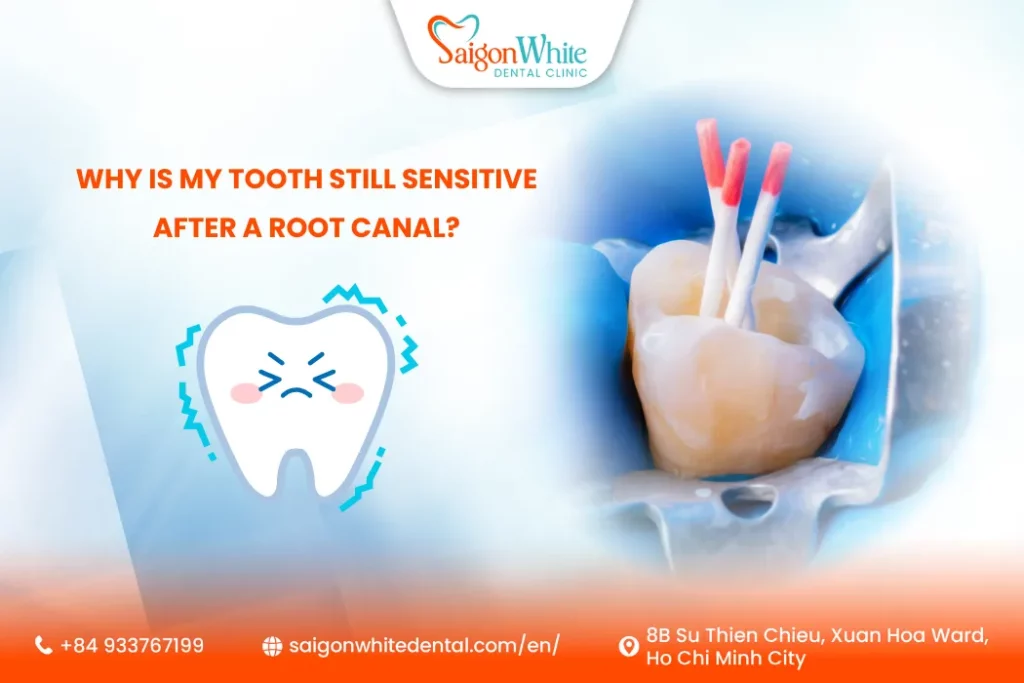A root canal is a highly effective dental procedure designed to eliminate infection and save a tooth. While many patients expect instant relief following the treatment, it’s not uncommon to experience some lingering tooth sensitivity or discomfort. So if you’ve asked yourself, “Why is my tooth still sensitive after a root canal?” — you’re not alone.
In this comprehensive guide, we’ll explain what’s normal, what might be a sign of concern, and what you can do to manage sensitivity after your root canal treatment.

What to Expect After a Root Canal
After a root canal, your dentist removes the infected pulp from inside the tooth, cleans the canals, and seals the space. This should eliminate the source of pain and infection. However, just like with any medical procedure, healing takes time.
Normal Post-Treatment Symptoms:
- Mild soreness or discomfort
- Sensitivity when biting or chewing
- Swollen or tender gum tissue
- Slight throbbing sensation around the treated area
These symptoms typically resolve within a few days to a week, and are considered a normal part of the healing process. Over-the-counter pain medication like ibuprofen or acetaminophen can help manage this temporary discomfort.
Types of Sensitivity After a Root Canal
Understanding the type of sensitivity you’re experiencing can help narrow down the possible cause.
1. Sensitivity to Pressure
You may feel pain or discomfort when you chew on the treated tooth. This could be due to:
- Inflammation in the tissues around the root
- Slight swelling of the periodontal ligament
2. Temperature Sensitivity
While the nerve inside the tooth has been removed, you may still feel temperature changes due to:
- Nearby nerves in the surrounding tissue
- Inflammation from the procedure itself
3. Throbbing Pain or Constant Dull Ache
This can sometimes occur from over-instrumentation (deep cleaning beyond the root tip), trauma, or, in rare cases, a missed canal or residual infection.
Common Reasons Why a Tooth May Still Be Sensitive
Let’s explore the most common reasons you might still feel discomfort or sensitivity after your root canal procedure:
1. Inflammation of Surrounding Tissue
Even though the pulp is removed, the tissues surrounding the tooth’s root can become irritated during the procedure. This inflammation is the body’s natural response and usually resolves on its own.
Timeframe: Usually improves within 3–7 days post-procedure.
2. High Bite (Malocclusion)
If the filling or crown placed after your root canal is too high, it can cause excess pressure every time you bite down. This leads to:
- Pain when chewing
- Headaches or jaw discomfort
- Long-term complications if not adjusted
Solution: A simple bite adjustment by your dentist can fix this quickly.
3. Temporary Filling Irritation
Many root canals are completed in multiple visits, with a temporary filling used between appointments. These fillings may irritate the surrounding gum or tooth structure, causing sensitivity.
4. Missed or Uncleaned Canal
In some cases, especially with molars, a hidden canal may go unnoticed. If bacteria remain in these spaces, an infection can persist.
5. Cracked or Fractured Tooth
If the tooth had a fracture before the root canal, it may not be structurally stable. Even a hairline crack can allow bacteria to enter, causing inflammation or infection post-treatment.
6. Nerve Pain from Adjacent Teeth or Tissues
Sometimes, the pain isn’t coming from the treated tooth. Referred pain from surrounding teeth, muscles, or nerves can create the illusion of root canal pain.
Example: An adjacent tooth might have an undiagnosed issue triggering sensitivity.
How Long Does Post-Root Canal Sensitivity Last?
It’s completely natural to feel some sensitivity after a root canal — even though the infected nerve has been removed. But how long should that discomfort last? The answer depends on several factors, including the condition of your tooth before treatment, the complexity of the procedure, and how your body heals.
Typical Healing Timeline
For most patients, mild to moderate sensitivity lasts anywhere from a few days to a week after the procedure. This is especially true if the area was inflamed or infected before the root canal.
Common short-term symptoms include:
- Tenderness when chewing or biting
- Slight soreness around the treated area
- Mild swelling or gum irritation
- A dull ache or “bruised” feeling
These symptoms should gradually subside without intervention.
When Is It Still Considered Normal?
You may continue to feel intermittent discomfort for up to 2 weeks, especially if:
- You had a severe infection or abscess before the procedure
- Your dentist needed to clean deep into multiple canals
- You grind your teeth or put pressure on the area during healing
The key is that the pain should be decreasing over time — not getting worse.
When It Might Be a Problem
If sensitivity:
- Lasts longer than 2 weeks, or
- Intensifies instead of improving, or
- Returns after initially disappearing,
…it may be a sign of a complication. These could include:
- A missed canal
- An unsealed filling or crown
- A crack in the tooth
- Ongoing infection in the surrounding tissues
In such cases, a follow-up visit is strongly recommended. Your dentist may take new X-rays, adjust your bite, or recommend retreatment if necessary.
What You Can Do During Recovery
- Take anti-inflammatory pain relievers (e.g., ibuprofen) as directed
- Avoid chewing on the treated side for a few days
- Eat soft, lukewarm foods
- Rinse with warm salt water to reduce gum inflammation
- Stay consistent with oral hygiene, but brush gently around the area
When Is It NOT Normal? Warning Signs to Watch For
Here are red flags that indicate your post-root canal sensitivity may be more than routine discomfort:
Severe or Increasing Pain
Pain should steadily decrease, not worsen. Intense throbbing or stabbing pain may signal infection.
Swelling in the Face or Gums
Facial swelling or a “puffy” feeling around the gums could mean an abscess is forming.
Fever or General Fatigue
A fever is your body’s way of fighting infection. Combined with fatigue and pain, it may indicate systemic infection.
Bad Taste or Odor
This could be a sign of pus or drainage from an infected root canal.
Pain That Returns Weeks Later
If the pain returns long after your root canal, you may need a retreatment or an apicoectomy (surgical cleaning of the root tip).
How to Manage Tooth Sensitivity After a Root Canal
If your symptoms are mild and within the normal healing timeframe, here’s what you can do to feel more comfortable:
1. Use Over-the-Counter Pain Medication
Ibuprofen (Advil) or acetaminophen (Tylenol) can help reduce inflammation and relieve discomfort.
2. Avoid Chewing on the Treated Side
Give the tooth a break while it heals—especially before the crown is placed.
3. Eat Soft Foods
Avoid nuts, chips, hard candy, and anything sticky for a few days.
4. Rinse With Warm Salt Water
This helps soothe inflamed gums and prevents bacterial growth.
5. Return to the Dentist for Follow-Up
If your bite feels uneven or symptoms persist, your dentist can evaluate and make the necessary adjustments.
Should You Worry About Needing a Retreatment?
In 5–15% of cases, root canal treatment may not succeed the first time. This may be due to:
- A missed canal
- Incomplete sealing
- New decay
- Tooth damage after treatment
When this happens, your dentist may recommend root canal retreatment. This involves reopening the tooth, cleaning it again, and re-sealing the canals. In some cases, an apicoectomy (removal of the tip of the root) may be performed.
Can a Crown Help Reduce Sensitivity?
Yes! Placing a dental crown is an important step in completing your root canal therapy.
Why a Crown Helps:
- Protects the weakened tooth from breaking
- Seals out bacteria that could re-enter
- Improves bite function
- Reduces temperature sensitivity
If your root canal was done recently but no crown has been placed yet, you may still feel discomfort. Ask your dentist about getting a permanent crown as soon as healing is complete.
Conclusion: Don’t Panic—But Pay Attention
Mild tooth sensitivity after a root canal is completely normal—especially in the first few days. However, if your pain is intense, lasts longer than expected, or worsens over time, you should see your dentist for a follow-up.
Quick Summary:
- Expect mild discomfort for 2–7 days
- Use OTC pain relief and soft foods during recovery
- Get your bite checked if pressure pain persists
- Don’t ignore swelling, fever, or recurring pain
- Ensure a crown is placed for long-term protection
At the end of the day, your comfort and dental health matter. Don’t hesitate to reach out to your dentist if something feels off. With proper care and attention, your root canal-treated tooth can serve you well for many years to come.
Experiencing sensitivity after your root canal? Visit Saigon White Dental Clinic for a thorough check-up and peace of mind.

 Book now
Book now